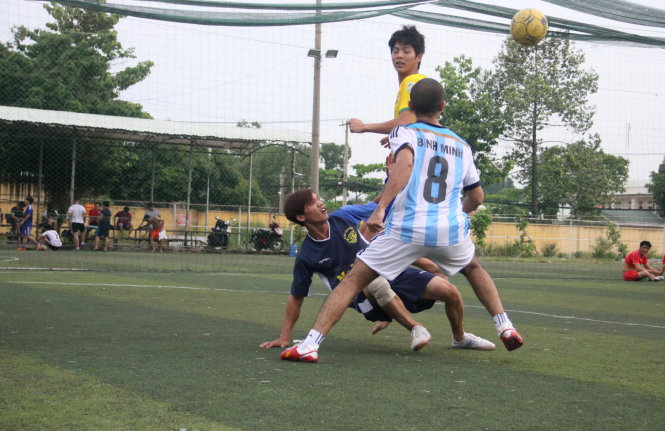More and more small stadiums with artificial grass have been built in Vietnam in the last ten years, but the construction quality of the facilities is seemingly falling since investors wish to reduce costs.
Thus, players face a higher chance of suffering injuries at those low quality stadiums, mainly injuries to knees, ligaments and sprained ankle.
Doctor Tang Ha Nam Anh, head of the traumatology department at Nguyen Tri Phuong Hospital in Ho Chi Minh City, said he has recorded a considerable increase in injury cases under treatment at his hospital.
Around ten years ago, when the first stadiums with artificial grass were built in the city, the hospital treated on average 100 cases of such injuries a year, mainly from traffic accidents.
In 2014, the hospital received 200 cases, and sixty percent of them occurred while playing sports.
People often ignore the construction quality of stadiums as one of top reasons leading to injuries, together with overload and impact in playing sports.
The hardness of stadium fields and its reactive power causes injury, confirmed the doctor.
Most small stadiums with artificial grass in Ho Chi Minh City now fail to meet standards, said Nguyen Thanh Nam, a veteran footballer and youth football coach.
“The layer of artificial grass is poor and very hard,” he concluded.
Van Xuan Thien, director of the Thanh Lam Sports Company and owner of many small stadiums with artificial grass in the city, said the quality is dropping because investors want to reduce the cost of construction.
It costs on average VND1 billion (US$45,500) to build a good stadium with artificial grass, but most stadiums in the city now cost just VND300 million ($13,600), he said.
A good stadium that meets FIFA standards has five layers of materials and a drainage pipe system at the bottom.
The five layers are, from the bottom, a 30cm layer of stone, a layer of special fabric, a layer of sand three centimeters thick, a layer of plastic grains and finally the top layer of artificial grass.
For the layer of plastic grains, there should be 15kg of grains for each square meter to absorb the shock of players running above.
But stadiums in Vietnam have just 5kg per square meter, just a third of the standards.
Each square meter of artificial grass that meets standards is priced US$28, but Vietnamese investors use Chinese-made grass for only US$12 a square meter.
But the artificial grass is outdated now. Stadiums in advanced nations are covered by EPDM, a kind of special synthetic rubber, on the top surface.
The EPDM stadiums can be used for many sports such as football, volleyball, basketball and handball.
The cost of building an EPDM stadium is around US$37 per square meter.





















































